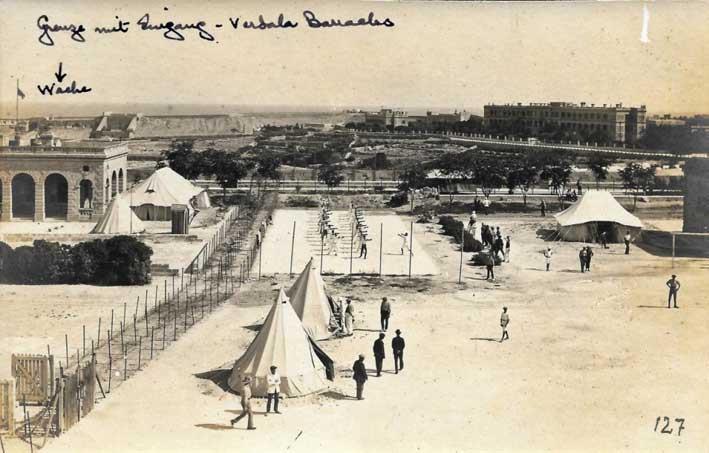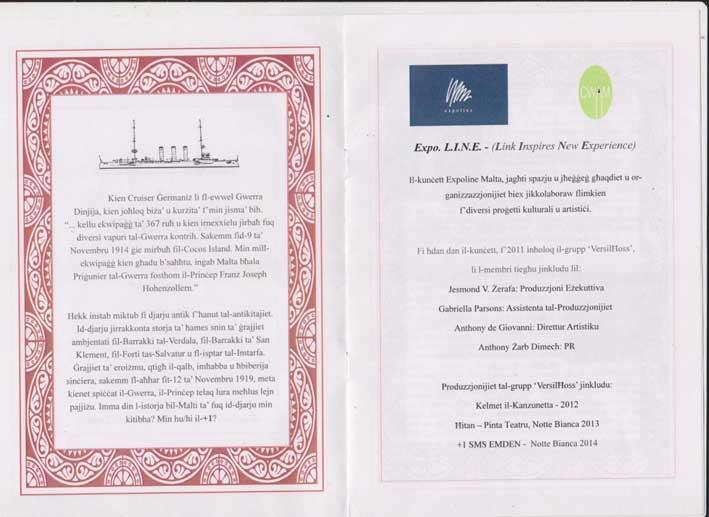This year marks the centenary of the end of what became known as the Great War, "the war to end all wars" or the First World War (1914-18). Individuals and organisations around the globe will be carrying out a variety of projects to commemorate the centenary. This will include projects of remembrance by communities, organisations, regional authorities and individuals.
Among several functions, during this world conflict, Malta fulfilled the important indirect role of welcoming thousands of wounded and sick soldiers arriving from the Mediterranean battlefields and for this became known as the "Nurse of the Mediterranean".
It performed other roles including an internment and prisoner of war camp. Among the most illustrious prisoners incarcerated here were the Captain and crew of the German cruiser S.M.S Emden.
This raiding cruiser, under the command of Captain von Muller and his first officer, Captain von Mucke was sunk after a succfessful commerce-rading cruise in the Indian Ocean.
Emden formed part of the German East Asiatic Squadron, which in early stages of the war, stalked Indian Ocean shipping routes and became the scourge of Allied naval ships. On 9 November 1914, H.M.A.S Sydney surprised the Emden while it was attacking the British radio station on the Cocos (Keeling) Islands and badly damaged it. The Emden was deliberately run aground. It lost 134 killed and 65 wounded; the Sydney lost four killed and 12 wounded.
The Captain and the ship's officers, including Lieutentant Franz Josef, Prince of Hohenzollern (Second Torpedo Officer on the Emden) of the German Royal Family (and nephew of the then King of Romania), were brought to Malta and locked up in the Verdala Fort where the crew were interned.
In 1915, the prisoners set up the German-Austro-Hungarian aid organisation, later being joined by the Turks. Von Muller was president of the organisation set up to help those prisoners, who lacked resources to maintain themselves.
In 1917, Captain von Muller was transferred to Britain but the rest remained in Malta until the end of hostilities.

Considered as the most famous of all POWs in Malta: crew members of S.M.S Emden, including its Captain von Muller and Prinz Franz Josef von Hohenzollern
The story of the Emden's officers and crew has been immortalised in Emden - My Experiences in S.M.S. Emden by Franz Joseph, Prince of Hohenzollern. This book, originally in German was translated into several other languages. The English-language version was published in the 1920s with a whole chapter dedicated to the Prince's incarceration at Fort Verdala.
An interesting reference about the prisoners of war camp in Verdala is also found in the book, Salter Album - Encounters in Malta's Prisoner of War Camps - 1914-1920, launched by the National Archives of Malta, in 2014.
The Salter Album is an autograph book of prisoners of war detained in Malta during the Great War, kept by George Salter, an English soldier serving at the camps. The following is an interesting reference about the Prince's captivity in Malta:
"The prisoners seemed, in general, to respect the British officers in charge, but if Prince von Hohenzollern is to be believed, they held the Maltese guards in contempt - their 'humanity' depended on how far you were prepared to bribe them; most of them made sure the inmates knew they were corruptible. A lot was possible for the prisoners, so long as they greased the Maltese guards with money or gifts. Sometimes even one bottle of whisky was enough to make them derelict their duties and look the other way."

Verdala Barracks with the hospital in the background (now St Edward's College)
S.M.S Emden was also presented as a short play as part of the Notte Bianca events of 2014. The play centred on the German Cruiser Emden's crew. The play tells the story of the five years the prisoners spent in Verdala Barracks (St Clement's Camp), Fort Salvatore and in Mtarfa Hospital. The story is based on acts of heroism, lost hopes, love and sincere friendship that lasted until 12 November 1919, after the war ended and the Prince was released from captivity and returned to his country.

Inside of flyer for the 2014 Notte Bianca Event (S.M.S Emden)
In his book Prince Franz Joseph describes his arrival in Malta on 6 December as "the worst day of my life". He detested the fact that he was being incarcerated on an island too far away from his homeland.
The Prince recounts of the treatment of the officers and crew in Malta as tolerable and describes how Captain Von Muller was given a room to himself while the rest of the officers were divided between three rooms.
Other prisoners and internees in Malta, mentioned by the Prince included shop-keepers and employees of hotels and big firms in Egypt and Malta, German, Austrian, Egyptain, Arabs and pro-Greeks. He describes the prisoners as all those who did not forward English interests or opposed them.
At first no communication was allowed between the different prisoners held in different camps but some time later communication was permitted. The Prince complained about the lack of room for exercise as only a narrow court yard was allotted, besides outlining quite a long list of complaints addressed to the camp authorities. This list is summarised and included the following:
- Lack of fresh vegetables.
- Prisoners not affording to buy food were not supplied with sufficient food.
- The ship's company of S.M.S Breslau accommodated in Fort Salvatore were cheated of a large portion of their proper allowance of food by English soldiers.
- For three years, the company of S.M.S Emden had been confined in rooms of which windows opening outwards were boarded up.
- Deprivation of any opportunity of taking fresh air during the cool time of the day which was especially painful in summer, during the severe heat. In fact, during the third summer of captivity, the state of health of the men had deteriorated.
- No rooms for those who wished to read, study, practise gymnastics, etc.,
- No room provided for Divine Services.
- Constant shortages of water. The lack of water was greater in St Clements Camp than in Verdala. A hot bath costed sixpence. Another grievance was that the state of latrines was scandalous.
- Barracks overfilled and full of bugs. The number of soldiers confined in the barracks was 650 men.
- With regard to St Clements camp there were 850 men accommodated there and the greater part had lived for three-and-a-half years in a tent.
- In Fort Salvatore 150 men spend three hopeless years shut off from the world by high walls.
- At the Polverista, the people were acommodated in space insufficient for exercise and which he describes as more fitted for beasts than men.
Other complaints were directed at Cottonera hospital facilities such as the treatment by specialists was not to be procured even if the patients were prepared to pay for it. Other complaints included the treatment of the civilian prisoners, the post, the canteen, medicaments, dentist and neutral representation for visiting and assessing the conditions of camps.
A special camp committee communicated with the English authorities on 21 March 1918.
The Prince mentioned corruptability, which was accepted by the English officers especially when offered money or whiskey. Some officers were even allowed to go for walks in Valletta after they bribed the English.
The Prince also mentions the lax guard duties that were present and here he makes reference to the incident when one of the prisoners (Lieutenant Fikentscher) escaped. After his incident, sentry duties were more strict.
He also describes happy moments when the camp orchestra gave performances on the birthdays of Kaiser Franz Joseph and after his death, that of Kaiser Karl. The men were allowed to hold festivities and decorate the barracks with flags.
The Prince also brought several matters before the Archbishop of Malta who promised to help in having two Franciscan fathers internees set free or at least accomodated in some Maltese cloister. From 1917 onwards, the men were allowed another favour, this time to bathe in summer in Marsascala Bay.
The Prince also speaks of the Pandemic Flu known as the Spanish Flu which he contracted in 1918. At the time the influenza was very rife in Malta and was very severe among the prisoners with 80% of them contracting it. This was not surprising due to the crowded conditions they were living in.
This disease raged at the same time all over the island and presented a colossal task to the English Red Cross, which was, however, well carried out.
On 12 November 1919, the Prince steamed away from Malta, together with Count Berhard von Matuschka, who had fought under Lettow-Vorbeck in German East Africa. As per conclusion the Prince describes this day as a great joy to be free again after five of the best years of his youth as a prisoner of war in Malta.
In writing this feature, I am indebted to Stephen Petroni, administrator of the FB page 'Malta WWI POW camp history'.